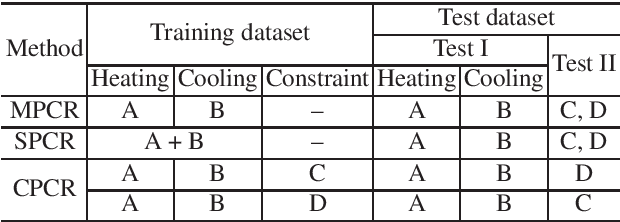Takahiro Saito
Fault Diagnosis Method Based on Scaling Law for On-line Refrigerant Leak Detection
Feb 22, 2019



Abstract:Early fault detection using instrumented sensor data is one of the promising application areas of machine learning in industrial facilities. However, it is difficult to improve the generalization performance of the trained fault-detection model because of the complex system configuration in the target diagnostic system and insufficient fault data. It is not trivial to apply the trained model to other systems. Here we propose a fault diagnosis method for refrigerant leak detection considering the physical modeling and control mechanism of an air-conditioning system. We derive a useful scaling law related to refrigerant leak. If the control mechanism is the same, the model can be applied to other air-conditioning systems irrespective of the system configuration. Small-scale off-line fault test data obtained in a laboratory are applied to estimate the scaling exponent. We evaluate the proposed scaling law by using real-world data. Based on a statistical hypothesis test of the interaction between two groups, we show that the scaling exponents of different air-conditioning systems are equivalent. In addition, we estimated the time series of the degree of leakage of real process data based on the scaling law and confirmed that the proposed method is promising for early leak detection through comparison with assessment by experts.
* 8 pages, 6 figures
Semi-supervised Approach to Soft Sensor Modeling for Fault Detection in Industrial Systems with Multiple Operation Modes
Feb 22, 2019



Abstract:In industrial systems, certain process variables that need to be monitored for detecting faults are often difficult or impossible to measure. Soft sensor techniques are widely used to estimate such difficult-to-measure process variables from easy-to-measure ones. Soft sensor modeling requires training datasets including the information of various states such as operation modes, but the fault dataset with the target variable is insufficient as the training dataset. This paper describes a semi-supervised approach to soft sensor modeling to incorporate an incomplete dataset without the target variable in the training dataset. To incorporate the incomplete dataset, we consider the properties of processes at transition points between operation modes in the system. The regression coefficients of the operation modes are estimated under constraint conditions obtained from the information on the mode transitions. In a case study, this constrained soft sensor modeling was used to predict refrigerant leaks in air-conditioning systems with heating and cooling operation modes. The results show that this modeling method is promising for soft sensors in a system with multiple operation modes.
* 7 pages, 1 figure
 Add to Chrome
Add to Chrome Add to Firefox
Add to Firefox Add to Edge
Add to Edge